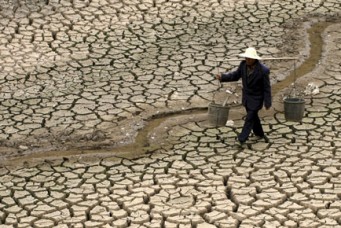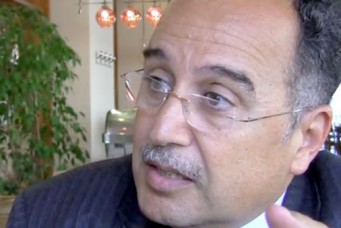Training Arab Policy Makers
Due to its geography and political standing, Egypt has interacted with the wider world throughout its long history. In taking its place on the international stage, it has produced honored statesmen and Nobel laureates. It has provided numerous global public servants, including a secretary general of the United Nations and a director general of the International Atomic Energy Agency.
Due to its geography and political standing, Egypt has interacted with the wider world throughout its long history. In taking its place on the international stage, it has produced honored statesmen and Nobel laureates. It has provided numerous global public servants, including a secretary general of the United Nations and a director general of the International Atomic Energy Agency.
With such a legacy in mind, and with a wary eye on the complex challenges facing Egypt and the Middle East, the American University in Cairo last year established the School of Global Affairs and Public Policy (GAPP) as the first institution of its kind in the region. GAPP’s mission is to prepare students to join the next generation of policy makers and policy shapers, by providing them with the multidisciplinary skills and global perspectives available in the school’s eight academic departments and research centers.
At GAPP’s inauguration, Dean Nabil Fahmy addressed the gravity of the policy challenges ahead when he contrasted human achievements like space exploration and disease eradication with human failures such as widespread poverty and nuclear proliferation.
“Passivism and apathy are not options or choices that we can afford or condone,” Fahmy warned. “Nor can the world community respond appropriately if it does not empower itself. It is time here and now to embrace the policies that will allow our collective genius to substitute and contain the avaricious greed that has often put us on the road toward self-destruction.” With the establishment of GAPP, he concluded, “We are determined to make a difference.”
Fahmy’s appointment as founding dean perhaps represents the imperative of educating future practitioners as well as theorists. He himself attended AUC, earning a Bachelor of Science degree in physics and mathematics in 1974 and a Master of Arts degree in management in 1976. Initially inclined to enter international banking after graduation, he turned to public service instead. He took up his current academic post coming from a distinguished career in Egypt’s foreign ministry, having served most recently as ambassador to the United States between 1999 and 2008 and as Egyptian envoy to Japan before that. In his numerous diplomatic assignments, including positions with Egypt’s United Nations mission, he often focused on security and arms control issues. He is the nonresident chair of the Middle East Nonproliferation Project of the James Martin Center for Nonproliferation Studies at the Monterey Institute of International Studies.
In taking on its mission, GAPP brings together the resources of three existing departments (Journalism and Mass Communication, Public Policy and Administration, and Law) and five research centers (the Cynthia Nelson Institute for Gender and Women Studies, the Center for Migration and Refugee Studies, the Kamal Adham Center for Journalism Training and Research, the Middle East Studies Center, and the Prince Alwaleed bin Talal bin Abdulaziz al-Saud Center for American Studies and Research).
Together, these offer students a rich mix of policy studies. The school’s formation did not alter core curricula, but its departments and research centers were directed to instill seven fundamental competencies in their existing programs: critical analytical skills, public policy orientation, a global perspective, multi- and interdisciplinary experience, quality research skills, professional experience, and effective communication skills.
With its dynamic approach and global perspective, GAPP is intent on establishing strategic partnerships with other institutions around the world. These already include ties with the Dubai School of Government (United Arab Emirates); the National Graduate Institute for Policy Studies (Japan); the Lee Kuan Yew School of Public Policy (Singapore); the Elliott School of International Affairs and the Trachtenberg School of Public Policy and Public Administration (both at George Washington University), and the Monterey Institute of International Studies (Middlebury College) in the U.S.; the Danish School of Media and Journalism (Århus, Denmark); and the Central Agency for Organization and Administration in Egypt.
A vital part of GAPP’s mission is its Executive Education Program, which is providing specialized management, communications, and analytical training for public officials in Egypt and throughout the region.
To further promote a public role, and to raise students’ awareness of public policy issues, Fahmy has undertaken several other initiatives as well. One of them is the creation of the Cairo Review of Global Affairs, GAPP’s quarterly policy journal.
Another is the launch of the Public Policy Lecture Series, which enables AUC students and Egyptians at large to hear the views of local and international figures from various fields. The series has played an especially important role since Egypt’s January 25 revolution. In public seminars at the AUC downtown campus, steps away from Tahrir Square, GAPP has brought together legal experts and leading politicians to debate critical issues facing Egypt’s transition to democracy, such as changes in the constitution and the formation of new political parties. The series kicked off last year with a speech on Turkish policy in the Middle East by Turkish Foreign Minister Ahmet Davutoglu, who attended AUC in the 1980s. Other earlier speakers in the series have included former UN under-secretary general Lakhdar Brahimi, French diplomat and author Eric Rouleau, and Academy Award-winning film director Costa Gavras.
In AUC’s ninety-two-year history, it has awarded degrees to more than twenty-five thousand students, many of whom went on to make significant contributions to public service. AUC’s establishment of the first school in the region dedicated to providing education and training in public policy comes at a particularly fitting moment, when political transformation is presenting the Middle East with new challenges and opportunities. “We are making the direct and invaluable link between theory and practice,” says Associate Dean Laila El Baradei: “We want our students to have a real impact on the policies of tomorrow.”




